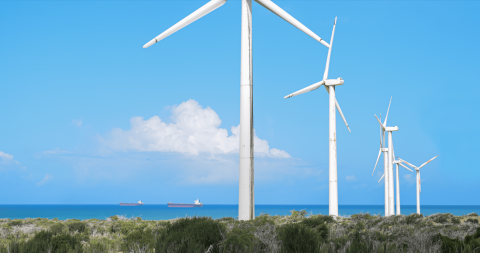
Last week’s COP26 edition of “Transparency Matters”, an event co-hosted with Chatham House, gathered representatives from the EITI, the Government of Indonesia, the European Commission, the International Council on Mining and Metals (ICMM) and Publish What You Pay (PWYP) to discuss how transparency and multi-stakeholder dialogue can help countries prepare for a transition to net zero.
With the world’s top leaders gathered in Glasgow for the UN Climate Change Conference, the global transition to net zero takes centre stage on the global agenda. The shift requires a transformation of the extractive industries and exposes producer countries - particularly those in developing economies - to imminent risks and opportunities.
“All the member countries of the EITI are affected in one way or another by the energy transition,” said Helen Clark, EITI Board Chair, in her opening remarks at the latest Transparency Matters webinar. “We welcome the focus at this COP on producer countries, and on what the transition to net zero will mean for their economies and societies. Those implications are what the EITI seeks to shine a light on in its contribution to addressing the energy transition.”
The statement from the EITI Board Chair outlined examples of how the EITI could support resource-dependent countries through data and disclosure, as well as through its inclusive platforms for dialogue among governments, industry and civil society, which are also outlined in the EITI’s newly-released policy brief and country case studies. She further stressed how diverse views and experiences are needed to identify smart and sustainable solutions to the climate crisis, noting that the quest for climate justice in all its forms is rising on the COP agenda.
Phasing out coal in Indonesia
Speaking on behalf of the Government of Indonesia, Dr. Ego Syahrial, Secretary General of the Ministry of Energy and Mineral Resources emphasised Indonesia’s strong commitment to tackling climate change, evidenced through the acceleration of renewable energy and the increasing use of electrical vehicles. Indonesia has committed to the reduction of greenhouse gas emissions by 29% by 2030, and by up to 41% with the support of international assistance.
Areas targeted by the Indonesian government include renewable energy development and mining reclamation. The retirement of coal-fired power stations or their conversion to other fuel sources is envisaged, alongside a moratorium on new coal-fired power stations not already included in government planning. Indonesia is one of the 12 EITI countries that signed the Global Coal To Clean Power Transition Statement last week.
A freeze on Arctic resources
Brendan Devlin, Advisor to the European Commission, highlighted the need for more systemic thinking to address the challenges posed by the transition. He identified three “signals” which the European Union is emphasising in its engagements at COP:
A call for resources in the Arctic to be kept in the ground and to avoid buying resources from the Arctic region, even when another party has developed them.
A policy and pledge on methane covering both producers and consumers, whereby consumers also have a responsibility to reduce emissions by choosing the cleanest resources.
An understanding that data plays a key role in informing policymaking, for example through a global registry of hydrocarbon resources.
Company actions: Emission reductions and disclosures
Rohitesh Dhawan, CEO of the International Council on Mining and Metals (ICMM), outlined the plans of the ICMM’s 28 member companies in relation to decarbonisation. These include clear commitments to abate company emissions with a target of net zero scope 1 and 2 emissions by 2050 or sooner.
Alongside emissions reductions, ICMM companies have committed to strengthening disclosures, by reporting in line with the Task Force on Climate-Related Financial Disclosures (TCFD) by 2023, if they are not already doing so. Commitments include annual reporting and external verification of scope 1, 2 and 3 emissions. In many cases, action is also being taken to support decarbonisation at a national level, for example through innovative programmes in South Africa to use mine sites as energy storage.
Addressing high expectations from fossil fuel development
Nelly Busingye, Member Engagement Manager for Africa at Publish What You Pay (PWYP), provided a keen reminder of the impact of decisions on the transition at a local level. "Many communities have given out their land to host extractive activities in anticipation of better jobs and opportunities," said Busingye. "We need to make information more clear and accessible to communities that host extractive activities, in order to demystify the changes are that planned for the transition.” She called for governments of EITI countries to focus on making this debate more prominent at a grass roots level and leverage the EITI’s multi-stakeholder platform to ensure the implications of the transition are clearly communicated.
In her closing remarks, Helen Clark stressed the need for such information to be in the public domain and available to civil society. "The EITI stands ready to support its implementing countries to advance country-level analysis on the economic implications of the transition, and to build the capacity of stakeholders to engage in informed debate on the associated risks and opportunities,” said Clark. She also indicated that the EITI would consider how efforts made by implementers should be reflected in future iterations of the EITI Standard.
The EITI would like to thank Chatham House for co-hosting this webinar as part of its Climate Risk and Security Virtual Pavilion, as well as the Natural Resource Governance Institute (NRGI) for their contribution to this event and to the EITI’s energy transition work.
Resources:
- Transparency Matters webinar recording
- Policy brief: Preparing for the energy transition
- Factsheets on pathways to energy transition in EITI implementing countries



